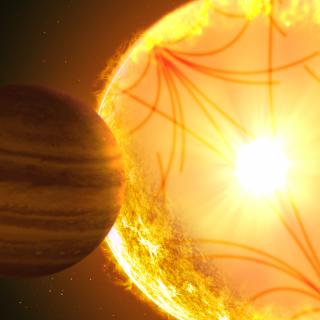Bibcode
Gillon, M.; Hatzes, A.; Csizmadia, Sz.; Fridlund, M.; Deleuil, M.; Aigrain, S.; Alonso, R.; Auvergne, M.; Baglin, A.; Barge, P.; Barnes, S. I.; Bonomo, A. S.; Bordé, P.; Bouchy, F.; Bruntt, H.; Cabrera, J.; Carone, L.; Carpano, S.; Cochran, W. D.; Deeg, H. J.; Dvorak, R.; Endl, M.; Erikson, A.; Ferraz-Mello, S.; Gandolfi, D.; Gazzano, J. C.; Guenther, E.; Guillot, T.; Havel, M.; Hébrard, G.; Jorda, L.; Léger, A.; Llebaria, A.; Lammer, H.; Lovis, C.; Mayor, M.; Mazeh, T.; Montalbán, J.; Moutou, C.; Ofir, A.; Ollivier, M.; Pätzold, M.; Pepe, F.; Queloz, D.; Rauer, H.; Rouan, D.; Samuel, B.; Santerne, A.; Schneider, J.; Tingley, B.; Udry, S.; Weingrill, J.; Wuchterl, G.
Bibliographical reference
Astronomy and Astrophysics, Volume 520, id.A97
Advertised on:
9
2010
Journal
Citations
33
Refereed citations
29
Description
We report the discovery by the CoRoT satellite of a new transiting giant
planet in a 2.83 days orbit about a V = 15.5 solar analog star (M_* =
1.08 ± 0.08 M_&sun;, R_* = 1.1 ± 0.1 R_&sun;,
Teff = 5675 ± 80 K). This new planet, CoRoT-12b, has a
mass of 0.92 ± 0.07 MJup and a radius of 1.44 ±
0.13 RJup. Its low density can be explained by standard
models for irradiated planets.
The CoRoT space mission, launched on December 27, 2006, has been
developed and is operated by CNES, with the contribution of Austria,
Belgium, Brazil, ESA (RSSD and Science Program), Germany and Spain.
Related projects

Helio and Astero-Seismology and Exoplanets Search
The principal objectives of this project are: 1) to study the structure and dynamics of the solar interior, 2) to extend this study to other stars, 3) to search for extrasolar planets using photometric methods (primarily by transits of their host stars) and their characterization (using radial velocity information) and 4) the study of the planetary
Savita
Mathur